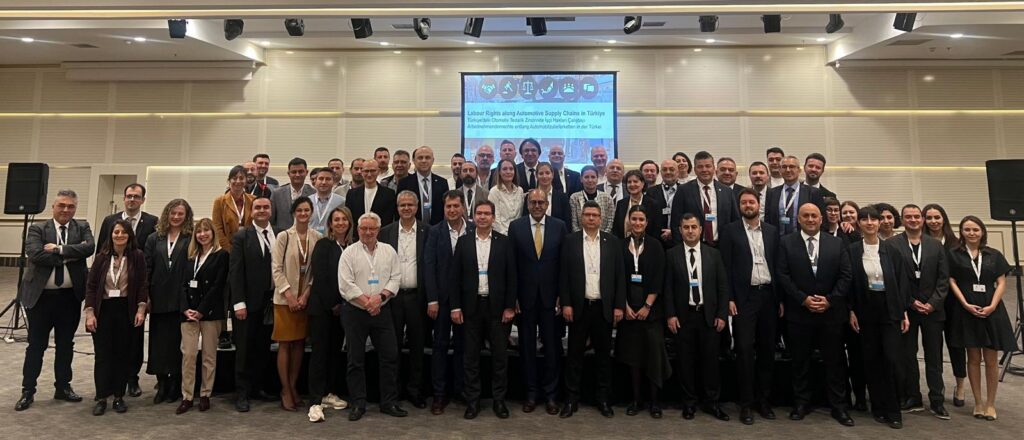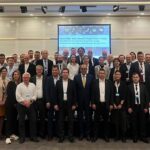15 May, 2025Building on the momentum of the workshop held in November last year, key stakeholders in the auto sector from Türkiye and Germany met in Ankara on 28–29 April for the second meeting of the multi-stakeholder dialogue platform. The aim is to promote and implement the principles and instruments of HRDD, particularly in the world of work and regarding trade union rights.
Like the previous meeting in November last year, this meeting was organized by IndustriALL, with support from German union IG Metall, the German Government via the Deutsche Gesellschaft für Internationale Zusammenarbeit (GIZ) GmbH and the German auto sector dialogue.
Launched by the Federal Ministry of Labour and Social Affairs in 2020, the Auto sector dialogue has brought together the federal government, automakers, suppliers, unions, business associations, NGOs and human rights institutions to advance human rights due diligence (HRDD) in supply chains. Over five years, the multi-stakeholder-forum has developed practical guidance and fostered collaboration across the sector. Though government funding is ending, participants have agreed to continue the work under the German UN Global Compact network, now self-financed by members.
The workshop brought together representatives from trade unions, the employers’ organization, automotive manufacturers, suppliers, government, academia and the International Labour Organization (ILO). Whereas the workshop participants confirmed the urgent need to tackle the systemic rights violations regarding FoA and CB, the attendees will also broaden the risk analysis and look into other areas such as OHS, working conditions and diversity.
"We must construct a rights-based economy grounded in social justice,"
said IndustriALL assistant general secretary Kemal Özkan.
“Healthy, equal working conditions are fundamental if we are to build sustainable sectors together."
Turkmetal’s president Uysal Altundağ, whose union hosted the meeting, said:
“Our union is organised around Türkiye’s export-driven sectors. We aim to strike a fair balance between workers’ rights and business interests—but with wages continuing to slide, this balance is becoming harder to maintain.”
Florence Göckeritz from Daimler Truck noted that whistleblower complaints from Türkiye indicated that workers encounter obstacles when attempting to join a union. Information on potential non-compliant behaviour was taken very seriously and carefully examined. In general, the cases underscore the need for robust mechanisms to deal with labour rights challenges and prevent conflicts.
“Concrete actions to make unionization possible at companies in Türkiye is needed, and this initiative has important potential for us to defend workers’ rights,”
said Özkan Atar, president of Birlesik Metal-Is.
There is currently a notable lack of structured dialogue in Türkiye’s automotive supply chains. Many issues concerning labour rights are escalated directly to the courts, bypassing mechanisms that could otherwise resolve conflicts through mutual engagement. Recognizing this, the multi-stakeholder platform is exploring ways to strengthen social dialogue as a means to pre-empt disputes, build trust and foster sustainable improvements in labour conditions.
“Social dialogue isn’t just desirable—it’s essential,”
said Yasser Hassan of the ILO.
“Dialogue at both enterprise and sectoral levels can build trust, reduce workplace conflict, and ensure compliance with international labour standards.”
As EU countries, particularly Germany, are among the main export destinations, suppliers in Türkiye will have to comply with legislation on human rights due diligence (HRDD). Workers’ and trade union rights are subject to this legislation. The laws not only require proper risk analysis and grievance mechanisms but also encourage stakeholders to address the root causes of rights violations.
The workshop delved into the implications of the European Union's Corporate Sustainability Due Diligence Directive (CSDDD), which mandates companies to identify and address human rights impacts throughout their supply chains.
Miriam-Lena Horn from the German Confederation of Trade Unions (DGB) emphasised the importance of involving stakeholders, including trade unions, in the due diligence process to ensure effective implementation and accountability.
“The CSDDD foresees consultation with relevant stakeholders along the supply chains, which will strengthen trade unions’ involvement,"
said Miriam-Lena Horn.
Participants worked in three thematic groups focusing on conflict prevention, conflict resolution and governance. The groups identified key areas for improvement, including the establishment of transparent grievance mechanisms, enhanced training on HRDD and the development of clear governance structures to oversee the implementation of agreed-upon measures.
Stakeholders expressed a strong commitment to continuing the dialogue and implementing the strategies outlined during the meeting. The dialogue will continue over the coming months, with working groups set to operationalise the roadmap and deliver concrete progress by year’s end.
Georg Leutert, IndustriALL auto director, highlighted the progress made:
"We now have a shared roadmap. But our next steps must turn good intentions into lasting structural change—starting with a renewed push for union rights. With this multistakeholder initiative, we have the opportunity to move away from a case-by-case basis and to tackle systemic labour rights challenges in a way that creates a sustainable solution for workers’ rights, working conditions and all other areas of HRDD in Türkiye's automotive supply chains.”
About the German sector dialogue
Launched by the German government in 2020, the Auto sector dialogue has brought together automakers, suppliers, unions, NGOs and human rights institutions to advance human rights due diligence (HRDD) in supply chains. Over five years, the initiative published practical guidance and fostered collaboration across the sector. Though government funding is ending, participants, including auto companies, IG Metall, IndustriALL, NGO’s and others , have agreed to continue the work voluntarily under the UN Global Compact Germany, now self-financed by members.








